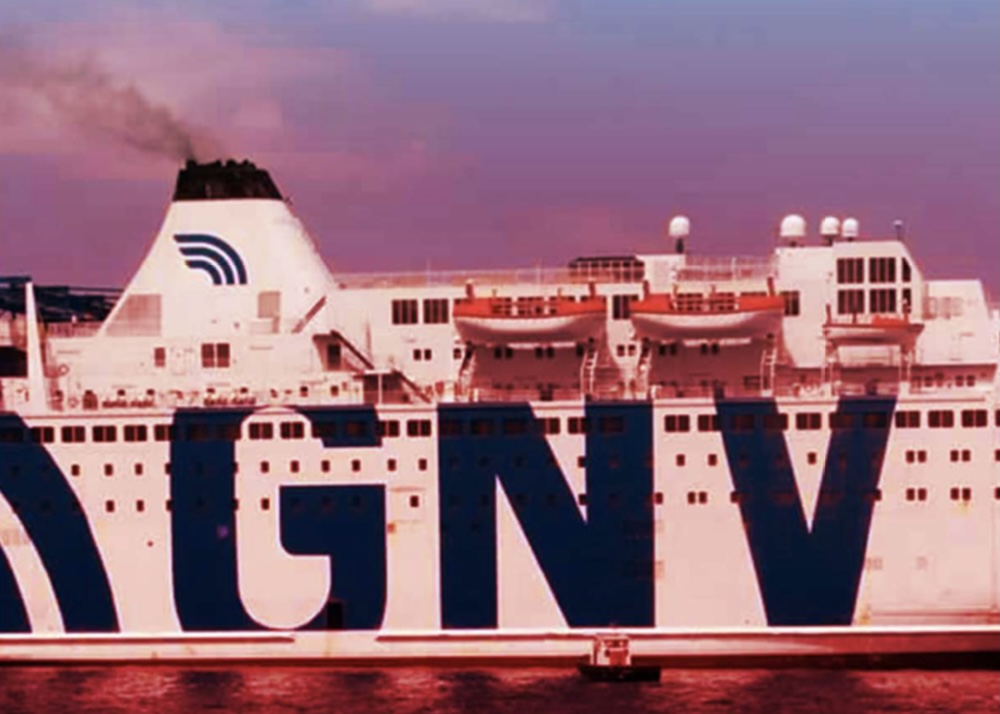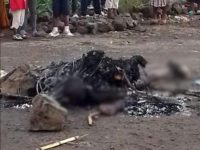In Bukavu, a woman protests in the streets against the authorities; the police shoot and…

Special Migrants / 150 Italian and International Organizations Call for a Stop to Quarantine Ships
“The protection of the right to life and health cannot vary according to nationality and origin”. NGOs, associations, scholars and researchers sign the document with proposals to make the reception system safe and dignified.
“The detention on board of naval units for carrying out the period of health surveillance of people rescued at sea or who landed autonomously in Italy represents a limitation of the freedom of movement of people and a violation of the prohibition of discrimination, since it is implemented in different ways for only foreign citizens on a migratory path and without any transparency and information about it “.
This is the first complaint highlighted by the document “Criticality of the ship-quarantine system for migrants: analysis and requests”, shared and signed by about 150 Italian and international organizations to which university professors, philosophers and humanitarian workers have also joined to ask the Ministry of the Interior, the Ministry of Transport, the Ministry of Health, and the Department of Civil Protection to close the model management of quarantine on ships, to improve and strengthen the reception system and to undertake measures that respect the safety, health and rights of all persons involved, without discrimination.
REQUESTS TO THE GOVERNMENT
The signatories ask for quarantine ships to be decommissioned as they seem to respond more to induced fears than to criteria of a safe, reasonable and humane management of the epidemic and migratory flows. They ask to reinvest the funds provided to the adaption of reception centers on land, and that, in the meantime, public and exhaustive communications are provided on the situation on board the ships making the procedures adopted – in particular with regard to minors and even people with serious vulnerabilities – transparent and public. The document also focuses on the need to guarantee adequate legal and health information to all people currently present on ships and a formal commitment to ensure that people already present in the area are no longer transferred to the ships. Finally, they ask that the practice of delivering the deferred refoulement decrees and expulsions delivered upon disembarkation be suspended.
HEALTH EMERGENCIES
Aware of the difficulties of the current situation, the precautionary quarantine tool is not questioned but, precisely because of this, there are many doubts about the effectiveness of this model in terms of containing the contagion. Managing hundreds of people in a large enclosed space where both positive cases and people in precautionary quarantine are isolate, where it is impossible to apply the distancing and complete isolation of positive cases and immediate transfer to hospital in case of need is problematic. It is neither a desirable nor a necessary model. According to various experts, the best solution would be to swab people in a timely manner and then arrange to transfer them to suitable places on land. In addition to the problems linked to the spread of the virus, there are also concerns about the worsening of previous health situations, psychological distress, the risk of traumatization and that on-board quarantine measures can cause violence, deprivation and torture on individuals who have already suffered traumatic events of various kinds. In the month of October alone, several cases of people who tried to escape by jumping into the sea from ships were reported in the media and there were also reports of acts of self-harm on board the same ships.
VIOLATIONS OF RIGHTS
The use of quarantine vessels is designed to be imposed exclusively on non-Italian people on a migratory path, resulting in a limitation of people’s freedom of movement: a highly discriminatory method. Isolated from the world, testimonies of the people held on board tell of an absence of care, as well as the lack of any type of legal information, and the impossibility of contacting lawyers, trusted doctors or associations in the area. Naval units appear to be used as “floating hotspots” to operate the arbitrary and preventive selection between asylum seekers and economic migrants, and as CPRs in arranging for repatriation. A case of very serious violation of rights occurred in the first half of October 2020 with the detention on board of unaccompanied minors. Also in October, the practice of taking foreign people already present in reception centers, even for many months, and transferring them to quarantine ships came to light through various reports. Illegal actions that appear to have been abandoned but without any public certainty.
THE ECONOMIC ASPECTS
The analysis conducted in the extension of the document also highlights how quarantine ships were found on the market by means of notices published by the Ministry for Infrastructures and Transportation using accelerated procedures. It is not possible to calculate the total cost of this operation, not only in economic terms but also in terms of safety costs and additional health care costs deriving from the need to operate at sea rather than on land. However, reconstructing the data on the basis of information from the Ministry of the Interior, we know that the cost of the structures on the ground is 30-40 euros per day per migrant; the same service at sea, on the basis of public notices and technical specifications, seems to average 150-200 euros per day for each guest. A clear and unbelievable disproportion and, once again, an absolute lack of information and transparency.
THE SOCIAL CONSEQUENCES
The use of quarantine ships only for migrants only increases the stigmatization of a specific population in Italy. In November 2020, out of 2,448 people on ships, only 197 were positive for COVID-19 (8% of which with infections occurring mainly in contexts of promiscuity experienced during the voyage). Added to the alarmist and totally unfounded debate on the public health risks posed by the arrival of “migrant-infectors” are the fears induced by the use of a “more secure” quarantine model declared as necessary for migrants that landed on our shores, as well as the shameful populist and xenophobic rhetoric of those who denounce the privilege granted to migrants to spend the quarantine on ships with bars, swimming pools and cinemas.
“The right to life and the right to health cannot vary according to nationality and origin. We must strengthen and improve a reception system that is safe and dignified.” This is the request of all the signatories united in the signing of the document “Criticality of the ship-quarantine system for migrants: analyzes and requests” which they ask to share.
Signatories
Coordinamenti nazionali
AOI/Associazione delle organizzazioni italiane di cooperazione e solidarietà internazionale
(di cui fanno parte 136 Organizzazioni e coordinamenti)
CISPM – Coalizione Internazionale Sans Papiers e Migranti
ENTI SOTTOSCRITTORI DELDOCUMENTO
COP – Consorzio Ong Piemontesi (di cui fanno parte 33 organizzazioni)
FOCSIV – Federazione Organismi Cristiani per il Servizio Internazionale Volontario (di cui
fanno parte 87 Organizzazioni)
Piattaforma ONG/OSC italiane Mediterraneo e Medio Oriente (di cui fanno parte 35
organizzazioni)
Rete Italiana Antifascista e Movimento Antirazzista Italiano
UNIRE/Unione Nazionale Italiana per i Rifugiati ed Esuli
Reti, associazioni locali, regionali, nazionali e internazionali aderenti
Forum Antirazzista Di Palermo
Cooperazione Internazionale Sud Sud/ CISS
Medici Senza Frontiere Italia /MSF
ACS Italia/Associazione di Cooperazione e Solidarietà
ADIF/ Associazione Diritti e Frontiere
ADDUMA/Avvocati dei Diritti Umani – Palermo
Amref Health Africa
Antigone Sicilia
ARCS-ARCI Culture Solidali APS
Arci Porco Rosso – Palermo
Arci Palermo
Arci Sicilia
ArteMigrante – Palermo
ASGI/Associazione per gli Studi Giuridici sull’Immigrazione
Assemblea permanente antirazzista e antifascista – Vicofaro, Pistoia
Associazione Antimafie “Rita Atria” – Palermo
Associazione Nazionale per la Pace
Associazione per la Pace – Padova
Associazione Psicologi nel Mondo-Torino
A-Sud – Sicilia
A-Sud
AUCI/Associazione Universitaria per la Cooperazione Internazionale – Roma
Baobab Experience – Roma
Basta Violenza alle Frontiere
Biblioteca Ibby – Lampedusa
Bocs – Circolo Arci Bagheria
Booq Palermo
borderline-europe
Borderline Sicilia
Bozen Solidale
CarovaneMigranti
Casa della Cooperazione Circolo Arci – Palermo
CCM/Comitato Collaborazione Medica
CEFA – Il seme della solidarietà Onlus
Centro Diaconale La Noce – Istituto Valdese – Palermo
Centro per lo Sviluppo Creativo “Danilo Dolci” – Palermo
CESIE | Centro studi e iniziative europeo
CISP/Comitato Internazionale per lo Sviluppo dei Popoli
CIAI/Centro Italiano Aiuti all’Infanzia
CLEDU/Clinica Legale per i Diritti Umani Università di Palermo
Collettivo Ujamaa – Torino
Comitato per la promozione e protezione dei diritti umani
Comitato Antirazzista Cobas – Palermo
Comitato Verità e Giustizia per i Nuovi Desaparecidos
COSPE ONLUS
CRIC/Centro Regionale di Intervento per la Cooperazione
Danish Refugee Council Italia
EducAid – Ong
Emergency Onlus Ong- Italia
Emmaus Italia
Emmaus Palermo
Eufemia APS – Associazione culturale
eXtinction Rebellion Palermo
eXtinction Rebellion Sicilia
Focus On Africa
Fondazione De La Salle Solidarietà Internazionale Onlus
Forum Lampedusa Solidale
Gambian Association Palermo
Giocherenda Palermo
Green Italia
Human Rights Youth Organization/HRYO
Ikenga – Circolo Arci – Palermo
Il Grande Colibrì
Il Manifesto
INTERSEZIONALE
Jekafò – Palermo
Laboratorio Andrea Ballarò – Palermo
Laici Comboniani Comunità La Zattera Palermo
LasciateCIEntrare
L.A.W. International / Legal Assistance Worldwide International
Legambiente Sicilia
Libera. Associazioni, nomi e numeri contro le mafie
Liberazione queer+ Messina
Linea d’Ombra – Organizzazione di Volontariato – Trieste
MAIS/movimento per l’Autosviluppo l’Interscambio e la Solidarietà Ong
Maghweb – Palermo
Mare memoria viva associazione – Palermo
Mater Africa Per la Cooperazione Internazionale Onlus
Médecins du Monde – Missione Italia
Medici contro la Tortura
Mediterranea Saving Humans
MIR Palermo
Moltivolti – Palermo
Movimento Shalom Onlus – Pisa
NAGA – ODV PER L’ASSISTENZA SOCIOSANITARIA E PER I DIRITTI DI CITTADINI
STRANIERI, ROM E SINTI – Milano
Nena News – Agenzia Stampa vicino Oriente
Next – Nuove Energie X il Territorio – Palermo
Niofar – Associazione dei giovani Senegalesi – Palermo
Ospiti in arrivo Onlus – Udine
Osservatorio contro le discriminazioni razziali “Nouredine Adnane” – Palermo
Osservatorio Solidarietà – Milano
Palermo Pride
Pellegrino della Terra – Palermo
Proactiva Open Arms
Progetto Diritti Onlus
Progetto Melting Pot Europa
Psicologi per i diritti umani
Rainbow4Africa
Refugees Welcome – Gruppo territoriale di Palermo
Rete antirazzista catanese
RE.TE Ong – Associazione di tecnici per la solidarietà e la cooperazione internazionale
Rete DASI – Rete Accoglienza FVG
Rete Milano
Sea-Watch
Strada Si.Cura
STRA VOX – Palermo
Terraferma – Sportello migranti Bagheria
Terra Nuova Centro per la Solidarietà e la Cooperazione tra i Popoli
Trinart Associazione di volontariato Palermo
UDI/Unione Donne Italiane – Palermo
Un Ponte per..
Voci Globali
ADESIONI INTERNAZIONALI
Association des Usagers de la Pada – Marsiglia
INFOKOLPA COLLETIVO – SLOVENIA
PRO ASYL, Germania
Flüchtlingsrat (Consiglio per i rifugiati) Schleswig-Holstein e.V., Kiel , Germania
Flüchtlingsrat (Consiglio per i rifugiati) Hamburg e.V., Germania
Flüchtlingsrat (Consiglio per i rifugiati) Niedersachsen e.V., Germania
Flüchtlingsrat (Consiglio per i rifugiati) Brandenburg, Germania
Saioa Bilbao Urkidi-Universidad del País Vasco/Euskal Herriko Unibertsitatea – Paesi
Baschi
Watch the Med – Alarm Phone
Caravana Abriendo Fronteras, Spagna
Ongi Etorri Errefuxiatuak, Paesi Baschi
Salvamento Maritimo Humanitario – SMH
Transnational migrant Platform, Spagna
ADESIONI PERSONALI:
Donatella Di Cesare, filosofa, saggista e editorialista, Docente Università “La Sapienza”
di Roma
Enrico Pugliese, Professore Emerito, Disse-Università di Roma Sapienza – Associato alla
ricerca Irpps-CNR
Francesco Martone, associate, Transnational Institute, Olanda
Giuseppe Burgio, Università “Kore” di Enna
Mari D’Agostino, Docente Università Degli Studi di Palermo
Giusto Picone, emerito Università Degli Studi di Palermo
Gaetano Gucciardo, docente Università Degli Studi di Palermo
Francesco Lo Piccolo, docente Università Degli Studi di Palermo
Alessandra Rizzo, Docente Università Degli Studi di Palermo
Elisabetta di Giovanni, Docente Università Degli Studi di Palermo
Vincenzo Fumetta, Università Degli Studi di Palermo
Valentina Castagna, Docente Università Degli Studi di Palermo
Furaha Nzirirane, Università Degli Studi di Palermo
Matteo Di Gesù, Docente Università Degli Studi di Palermo
Elena Mignosi, Docente Università Degli Studi di Palermo
Vincenzo Pinello, Docente Università Degli Studi di Palermo
Elaine Acosta González, Visiting Scholar, Cuban Research Institute, Florida international university




